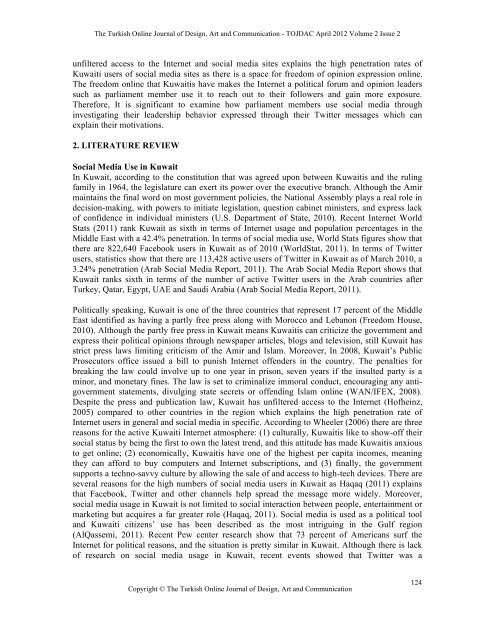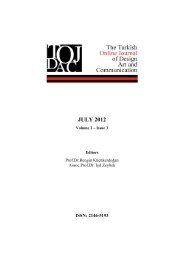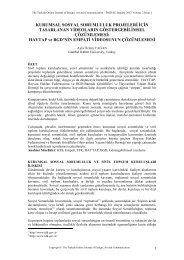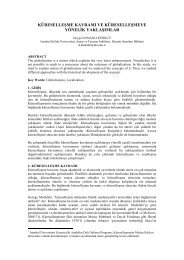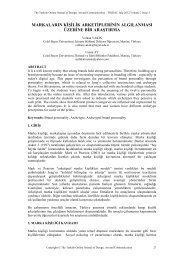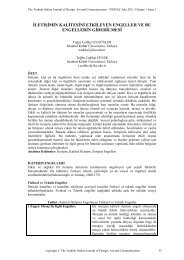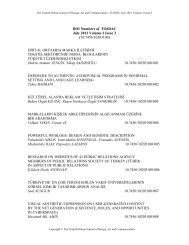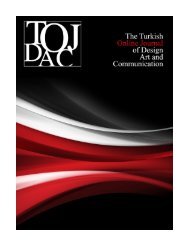aprıl 2012 - tojdac.org
aprıl 2012 - tojdac.org
aprıl 2012 - tojdac.org
Create successful ePaper yourself
Turn your PDF publications into a flip-book with our unique Google optimized e-Paper software.
The Turkish Online Journal of Design, Art and Communication - TOJDAC April <strong>2012</strong> Volume 2 Issue 2<br />
unfiltered access to the Internet and social media sites explains the high penetration rates of<br />
Kuwaiti users of social media sites as there is a space for freedom of opinion expression online.<br />
The freedom online that Kuwaitis have makes the Internet a political forum and opinion leaders<br />
such as parliament member use it to reach out to their followers and gain more exposure.<br />
Therefore, It is significant to examine how parliament members use social media through<br />
investigating their leadership behavior expressed through their Twitter messages which can<br />
explain their motivations.<br />
2. LITERATURE REVIEW<br />
Social Media Use in Kuwait<br />
In Kuwait, according to the constitution that was agreed upon between Kuwaitis and the ruling<br />
family in 1964, the legislature can exert its power over the executive branch. Although the Amir<br />
maintains the final word on most government policies, the National Assembly plays a real role in<br />
decision-making, with powers to initiate legislation, question cabinet ministers, and express lack<br />
of confidence in individual ministers (U.S. Department of State, 2010). Recent Internet World<br />
Stats (2011) rank Kuwait as sixth in terms of Internet usage and population percentages in the<br />
Middle East with a 42.4% penetration. In terms of social media use, World Stats figures show that<br />
there are 822,640 Facebook users in Kuwait as of 2010 (WorldStat, 2011). In terms of Twitter<br />
users, statistics show that there are 113,428 active users of Twitter in Kuwait as of March 2010, a<br />
3.24% penetration (Arab Social Media Report, 2011). The Arab Social Media Report shows that<br />
Kuwait ranks sixth in terms of the number of active Twitter users in the Arab countries after<br />
Turkey, Qatar, Egypt, UAE and Saudi Arabia (Arab Social Media Report, 2011).<br />
Politically speaking, Kuwait is one of the three countries that represent 17 percent of the Middle<br />
East identified as having a partly free press along with Morocco and Lebanon (Freedom House,<br />
2010). Although the partly free press in Kuwait means Kuwaitis can criticize the government and<br />
express their political opinions through newspaper articles, blogs and television, still Kuwait has<br />
strict press laws limiting criticism of the Amir and Islam. Moreover, In 2008, Kuwait’s Public<br />
Prosecutors office issued a bill to punish Internet offenders in the country. The penalties for<br />
breaking the law could involve up to one year in prison, seven years if the insulted party is a<br />
minor, and monetary fines. The law is set to criminalize immoral conduct, encouraging any antigovernment<br />
statements, divulging state secrets or offending Islam online (WAN/IFEX, 2008).<br />
Despite the press and publication law, Kuwait has unfiltered access to the Internet (Hofheinz,<br />
2005) compared to other countries in the region which explains the high penetration rate of<br />
Internet users in general and social media in specific. According to Wheeler (2006) there are three<br />
reasons for the active Kuwaiti Internet atmosphere: (1) culturally, Kuwaitis like to show-off their<br />
social status by being the first to own the latest trend, and this attitude has made Kuwaitis anxious<br />
to get online; (2) economically, Kuwaitis have one of the highest per capita incomes, meaning<br />
they can afford to buy computers and Internet subscriptions, and (3) finally, the government<br />
supports a techno-savvy culture by allowing the sale of and access to high-tech devices. There are<br />
several reasons for the high numbers of social media users in Kuwait as Haqaq (2011) explains<br />
that Facebook, Twitter and other channels help spread the message more widely. Moreover,<br />
social media usage in Kuwait is not limited to social interaction between people, entertainment or<br />
marketing but acquires a far greater role (Haqaq, 2011). Social media is used as a political tool<br />
and Kuwaiti citizens’ use has been described as the most intriguing in the Gulf region<br />
(AlQassemi, 2011). Recent Pew center research show that 73 percent of Americans surf the<br />
Internet for political reasons, and the situation is pretty similar in Kuwait. Although there is lack<br />
of research on social media usage in Kuwait, recent events showed that Twitter was a<br />
Copyright © The Turkish Online Journal of Design, Art and Communication<br />
124


